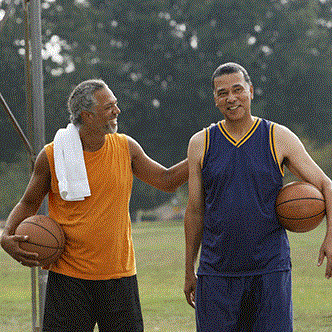
There’s no need for healthy adults to shy away from playing sports, according to a study confirming the high-benefit/low-risk nature of sports activity during middle age.
Published in the American Heart Association journal Circulation, this study measured the frequency of sudden cardiac arrest in middle-aged adults participating in sports activities. Sudden cardiac arrest occurs when the heart suddenly and unexpectedly stops beating. While rare, sudden cardiac arrest can be triggered by physical activity. Since exercise is critical to good health, experts worry that fears of sudden cardiac arrest may discourage adults from certain activities.
To learn more, researchers analyzed data from the Oregon Sudden Unexpected Death Study, which included 1,247 sudden cardiac death cases in adults between 35–65 years of age. Among all cases, only 5% occurred during sports activities and were much more common in men than women. Among sudden cardiac arrests that occurred during sports, roughly one-third of cases had signs of heart problems the week before, and more than half of cases had at least one cardiovascular risk factor such as high blood pressure or diabetes. Interestingly, survival rates were significantly higher among sports-related sudden cardiac arrest, likely because they were more likely to be in public and receiving immediate CPR.
The take home message, as authors point out, is that sports-related sudden cardiac death is very rare in middle-aged adults. Not only is sudden cardiac death a rare occurrence in all adults, it’s unlikely that sports or physical activity will trigger this condition in adults healthy enough to exercise. In addition, exercise is much more likely to promote better health than cause harm and reduces risk of heart events like heart attack and stroke.
In cases where sudden cardiac death does occur, however, this study highlights the importance of immediate treatment. Since sports-related sudden cardiac arrests in this study were more likely to occur in a public place, victims were more likely to receive CPR, which helped increase survival rates. CPR can double or triple a victim’s chance of survival, yet less than one-third of cardiac arrest victims receive CPR from a bystander. Since roughly 88% of sudden cardiac arrests occur at home, away from the public, it’s important to be trained in CPR and to encourage family and friends to do the same.